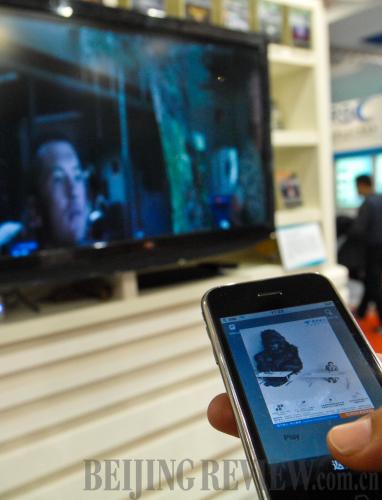|
 |
|
EASIER ACCESS: Smart phones put search engines at people's fingertips, but what are the costs of this convenience? (ZHANG YU) |
Huang Juan in southwest China's Chongqing Municipality hadn't visited a hospital for years. Instead, she used Internet search engines to diagnose illnesses herself.
"By using search engines such as Google or Baidu, you can get almost all the information of a disease and a greater variety of treatment methods than what you can get from doctors," Huang said.
Much like English-speakers instruct one another to "google it" for answers to all sorts of questions, Chinese netizens are also fond of using local search engine, Baidu, as an informal verb.
Everything was fine until May, when Huang developed a cough and a low fever. She submitted her symptoms as a Baidu search query, and diagnosed herself with a common cold. She then bought some cold medicine from a drug store, but her symptoms worsened. After a month, she finally visited a doctor, who told her she had bronchitis. What's worse, the delayed diagnosis resulted in additional complications.
Liu Lianxing, a 24-year-old man in Chongqing, also preferred to check his symptoms online and make diagnoses by himself. In April, Liu suffered from nausea and vomiting as well as loose bowels after meals. He checked all these symptoms with a search engine and the results suggested the early symptoms of gastric cancer.
"This really freaked me out. I dared not go to hospital and thought I was going to die," said Liu, who lost sleep and couldn't concentrate on work. When a coworker finally dragged Liu to a doctor, he found out he just had chronic gastroenteritis.
"I will never trust search engines that much from now on," Liu said. "Even if I don't have any diseases, I might be frightened to trigger symptoms of one."
Life Times, a major weekly public health publication, conducted a survey in 2009 on how many people would turn to search engines for diagnoses and treatments for diseases. The result showed that 64.76 percent of the respondents would go to search engines for treating methods and 56.3 percent said that they successfully cured minor diseases with answers from search engines.
Information overload
For Huang and Liu and many other netizens, search engines are not just used for checking medical information but almost everything they need in everyday life, such as how to cook, how to manage a tour and where to get cheaper commodities.
"It has almost everything, and sometimes the problem is that it answers too much," said Zhang Lijun, a 25-year-old woman in Beijing.
Zhang once tried to find some tips to travel and shop in Hong Kong, and got thousands and thousands of results. "I spent almost a whole day searching it but still couldn't decide where to go and what to do," she said
Wu Xiaoli calls it a distraction. Wu works in a bank in Shanghai and admits she spends a lot of time on search engines but it is not highly efficient at all.
"It seems fast and covers all the information, but people easily get lost in the massive amount of information," Wu said. "For example, when I checked comments of a cosmetic brand, I might find someone saying she tried this brand while she is in the process of losing weight and other people would ask her the effective ways to lose weight and I would follow that. Finally I even couldn't remember what I originally wanted to check."
Zhang once browsed a new skirt released by Chanel and discovered an actress had worn the same skirt. She ended up spending the next two hours streaming the actress' latest movie.
But at the same time, Zhang also found out the information in search engines is more or less the same. "Every time when we need to hand in the annual summary, it turns out that almost everybody follows the same template they found online," Zhang said.
| 